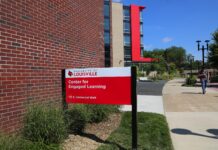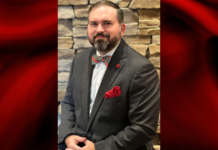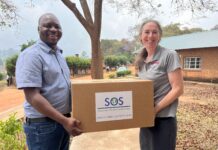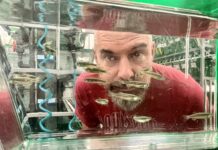
LOUISVILLE, Ky. – More than a dozen internationally recognized scientists from across North America and Great Britain working at the forefront of cell and molecular biology of development and disease are scheduled to speak in Louisville at the 25th Annual Kentucky Spinal Cord and Head Injury Research Trust Symposium, May 15-16, 2019. The two-day program will cover the most recent directions and conceptual advances in spinal cord injury research.
Ian Wickersham, Ph.D., of the Massachusetts Institute of Technology will deliver the keynote presentation on re-engineering the rabies virus. In his Ph.D. work, Wickersham and his colleagues introduced the use of recombinant rabies virus as a tool for neuroscience and originated the paradigm of monosynaptic tracing, meaning the use of a genetically modified viral vector to identify neurons directly connected to a targeted neuronal population. Wickersham joined MIT in 2007 and started the Genetic Neuroengineering Group there in 2013.
Extensive time for poster sessions will allow participating trainees to highlight their research and foster new collaborations among senior scientific colleagues.
The symposium is sponsored by the Kentucky Spinal Cord and Head Injury Research Trust, The Craig H. Neilsen Foundation, The University of Louisville School of Medicine and the Kentucky Spinal Cord Injury Research Center. The annual event is hosted in alternating years by UofL and the University of Kentucky. The 2019 event will be held at the Louisville Downtown Embassy Suites Hotel.
Symposium registration fees, including breakfast, lunch and reception for all attendees:
- Professional or Faculty: $275
- Postdocs, Residents, Staff, Community Members: $155
- Students: $90
To register: http://bit.ly/KSCHIRT25
Rooms are available at the Louisville Downtown Embassy Suites for the special symposium rate of $159/night plus tax. Room reservations may be made by calling 1‐502‐813‐3800 and referencing the 25th KSCHIRT Symposium. The deadline for hotel reservations at the symposium rate is April 16.
Preliminary program:
Wednesday, May 15, 2019
Opening Remarks – Scott R. Whittemore, Ph.D., Director, Kentucky Spinal Cord Injury Research Center, University of Louisville
Introduction of Keynote Speaker – Brandon Brown, M.S., UofL
“Re-engineering rabies virus” – Ian Wickersham, Ph.D. – Massachusetts Institute of Technology
Session One: Big Data Approaches to Big Questions
Chair: Beatrice Ugiliweneza, Ph.D., UofL
“Integrating mechanistic molecular insight with large-scale genomics: Path toward personalized therapeutics” – Wolfgang Sadee, Dr.rer.nat. – The Ohio State University
“Accelerating reproducibility and clinical translation through data science: A brief history of data sharing, machine learning and discovery in neurotrauma” – Adam Ferguson, Ph.D. – University of California, San Francisco
Session Two: Novel Approaches For Investigating Bladder And Bowel Dysfunction
Chairs: Charles Hubscher, Ph.D., April Herrity, DC, Ph.D. and Teresa Pitts, Ph.D.
“Neurogenic bowel at the enteric-smooth muscle interface” – Gregory Holmes, Ph.D. – Penn State University
“Opportunities for closed-loop neuromodulation to improve bladder control” – Dennis Bourbeau, Ph.D. – Case Western Reserve University and Louis Stokes Cleveland VA Medical Center
Session Three: Mechanisms of Systemic Disease In Neuroscience
Chairs: Michal Hetman, M.D., Ph.D. and Sujata Saraswat Ohri, Ph.D.
“Spinal cord injury-induced immunodeficiency is mediated by a sympathetic-neuroendocrine adrenal reflex” – Jan Schwab. M.D., Ph.D. – The Ohio State University
“Modulating the mitochondrial electron transport chain protects against trauma-induced neurodegeneration: What can a worm teach us about brain injury?” – Peter Douglas, Ph.D. – University of Texas Southwestern Medical Center
“Circadian influences on neurodegeneration” – Eric Musiek, M.D., Ph.D. – Washington University School of Medicine
Session Four: From Motor Units To Rehabilitation
Chairs: David Rouffet, Ph.D. and Jessica D’Amico, Ph.D.
“The arms give the legs a helping hand in locomotor rehabilitation” – Gregory Pearcey, Ph.D. Candidate, M.Sc., Bkin, CSEP-CEP – University of Victoria
“Man-machine interfacing by decoding spinal motor neuron behavior” – Dario Farina, Ph.D. – Imperial College, London
“Use of robots and optimal control theory to study sensorimotor function and dysfunction” – Stephen Scott, Ph.D. – Queen’s University
Thursday, May 16, 2019
Session Five: Emerging Topics
Chair: James Shaughnessy, D.M.D., Kentucky Spinal Cord and Head Injury Research Trust
University of Louisville and University of Kentucky Trainees
Session Six: Novel Techniques Driving Novel Neuroscience
Chair: Scott R. Whittemore, Ph.D.
“Light-sheet microscopy in CNS injury and neuroregeneration” – Pantelis Tsoulfas, M.D. – University of Miami
“The mechanical regulations of neuronal growth and regeneration” – Kristian Franze, Ph.D. – University of Cambridge
“3-D Printed neural regeneration devices” – Michael McAlpine, Ph.D. – University of Minnesota
Session Seven: Developmental Plasticity: From Pediatrics to Adults
Chairs: Andrea Behrman, Ph.D. and David Magnuson, Ph.D.
“Early, intensive leg training to enhance gross motor function in children with perinatal brain injury” – Jaynie Yang, PT, Ph.D. – University of Alberta, Edmonton
“Optimizing motor recovery for children and adults with cerebral palsy” – Kathleen Friel, Ph.D. – Cornell University Medical College
“New advances into the diencephalic control of locomotion” – Patrick Whelan, Ph.D. – University of Calgary
#WeAreUofL






























